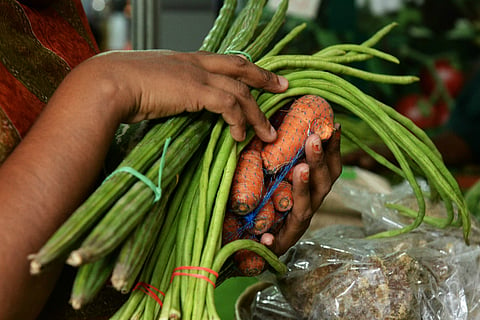

For the last few years, Kerala has seen a lot of debate on the influx of pesticide-sprinkled vegetables from neighbouring states. Malayalis saw the media, government institutions, social groups and even political parties carry on a sustained campaign against such tainted veggies.
In parallel, a silent revolution unfolded in the backyards, terraces, poly-houses, road-sides and even in the balconies of Kerala homes, with small scale organic farming undertaken by ordinary housewives and husbands and even school children.
When Malayali’s favourite actress Manju Warrier made a come-back to the film industry in 2014 through a movie which propagated the idea of rooftop farming, she -by default- became the brand ambassador for organic farming in Kerala.
Veteran actor Sreenivasan too joined the organic bandwagon with his highly publicized inroads into paddy-cultivation on leased lands, with the harvest reaped from these garnering even more widespread applause.
Once upon a time, Kerala too was self-sufficient in vegetable-production and paddy cultivation. The passing of years however saw it shift its focus to cash crops, thereby making it eventually dependent on Tamil Nadu and Karnataka for vegetables, and on Andhra Pradesh for rice.
With alarming reports of large-scale use of pesticides and insecticides in Tamil Nadu farms, Kerala was forced to take a relook at the options organic farming held out for a healthy life.
People across the spectrum took to it in a big way, with apartments, flats, houses and even road-sides doubling up as unlikely but suitable venues for cultivation.
Speaking to The News Minute, Kerala Agriculture Minister VS Sunil Kumar was pleased to inform that the state has produced 81,000 metric tons of vegetables in time for Onam -the state festival due in September- that would ensure that Keralites will now not have to depend on vegetables bought from across the state border.
“For this year’s Onam, Kerala will not have to depend much on vegetables from other states. We have made all arrangements to make 81000 metric tons of organic vegetables available for public consumption. Vegetables collected from organic farms will be sold under the brand of Farm Fresh Kerala,” the Minister says.
Sunil Kumar reiterates that the LDF government aims to develop a concept of ‘quality’ as opposed to ‘quantity’ among the masses.
“Every house should have a small cultivable area, be it a terrace, balcony or a backyard. Since most families are nuclear, very less space is actually needed for the same. Kerala has now come to reflect such a trend,” he feels.
He also shares his vision for large-scale commercial farming. “Commercial farmers will be encouraged to indulge in good agricultural practices which include use of organic pesticides and fertilizers, and other healthy alternative solutions to meet their commercial targets,” he avers.
“Organic farming has largely increased in Kerala. Till a few years ago, more than 60% of the vegetables were bought from other states. But now the situation has changed and we produce more than 50% here,” shares Kerala Horticorp Managing Director, Dr Ranjan S Karippai with The News Minute.
“A large number of people are turning to farming in urban and semi-urban areas. That is why the number of grow-bags sold by the department has seen a sudden spike, with many people now approaching us for setting up of poly-houses,” he tells.
According to Ranjan, the department distributes an average of five lakh grow-bags every year. “Kerala may not yet attain 100% self-sufficiency, but people are more aware now. They are deeply concerned about the food they consume, so we could actually usher in a new trend,” he opines.
Studies conducted by the Kerala Agriculture University (KAU) over the years provided the much-needed boost to this changing trend in an average Malayali’s food habits, as these studies conclusively proved the presence of high amounts of pesticides in vegetables from Tamil Nadu.
A recent report published by KAU in June 2016 have certified that the vegetables produced in Kerala organic farms and made available at organic outlets are 100% safe to consume.
Dr Thomas Biju Mathew of the Pesticide Residue Lab at the Agricultural College in Vellayani says that they are on a continuous research mode, so as to ensure that vegetables available in the market even under the ‘Organic’ brand are safe for consumption.
The Communist Party of India (Marxist) had opened around 200 organic vegetable stalls in the last Onam season. Apart from cultivating on the land the party owns, it also encourages individuals who are into both small and large-scale farming. This year too, the party has announced the opening of more such vegetable stalls during Onam.
Colleges, self-help groups and even a few religious institutions too seem to have been bitten by the organic bug.
Both the Rajagiri Engineering College and the Sacred Heart College in Ernakulam have been cultivating around three acres of land, with their last year’s bumper harvest having even hogged headlines.
Given the nature of this green venture, the involvement of Kudumbasree self-help groups was inevitable, and they now top the list, when it comes to setting up of organic vegetable markets across the state. As per news reports, Kudumbasree alone farms around 50,000 hectares of land in Kerala.
All Photos : Sreekesh Raveendran Nair